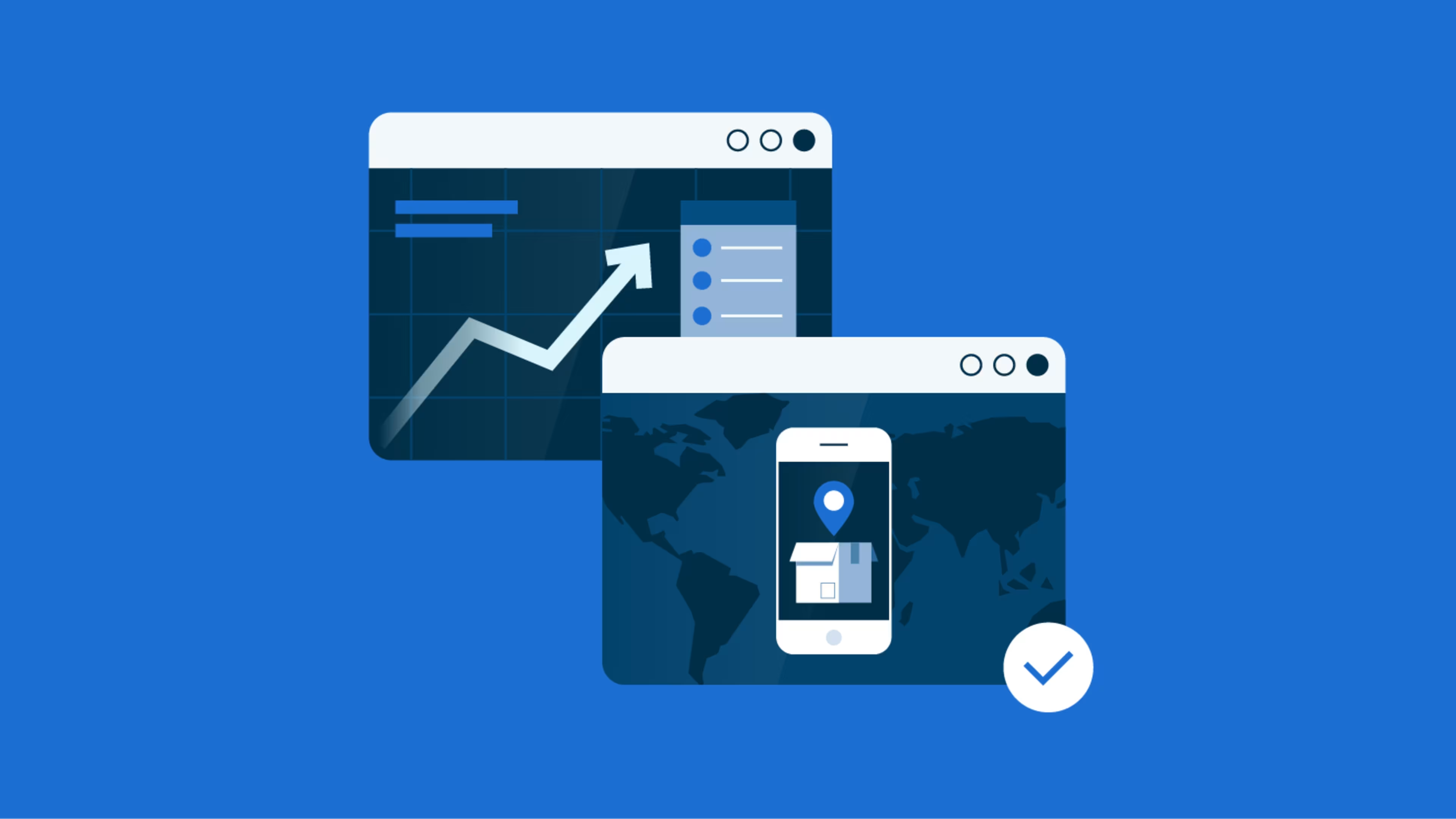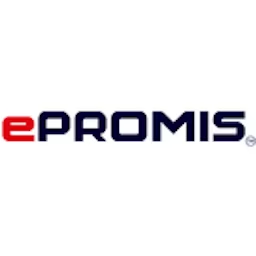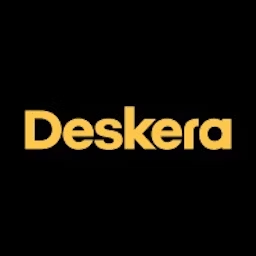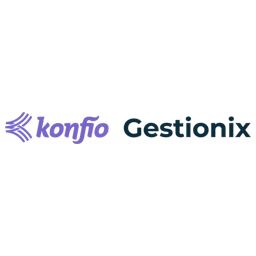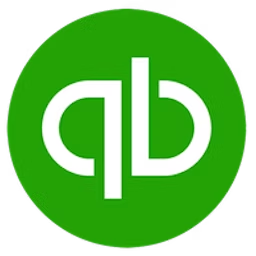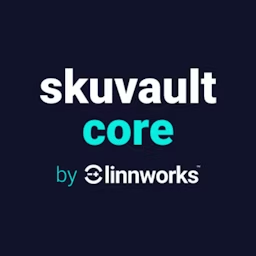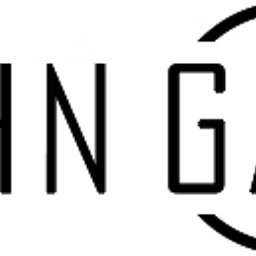Enterprise resource planning (ERP) and supply chain management (SCM) software are designed to automate business processes and improve operational efficiency. While both these platforms offer common functionality, such as enhanced real-time data visibility into business operations and financial planning, they have different approaches and functionality.
ERP software is a business operations management tool that automates accounting, sales, and other important business processes. On the other hand, supply chain management software is only used for managing supply chain operations, including order fulfillment and demand forecasting. Overall, the functionalities of ERP software extend far beyond the management and planning of resources and supply chain processes.
This article discusses the similarities and differences between ERP and supply chain management (SCM) software so you can select the right one for your needs. We've also included each category's top five products based on verified software reviews. Read more.
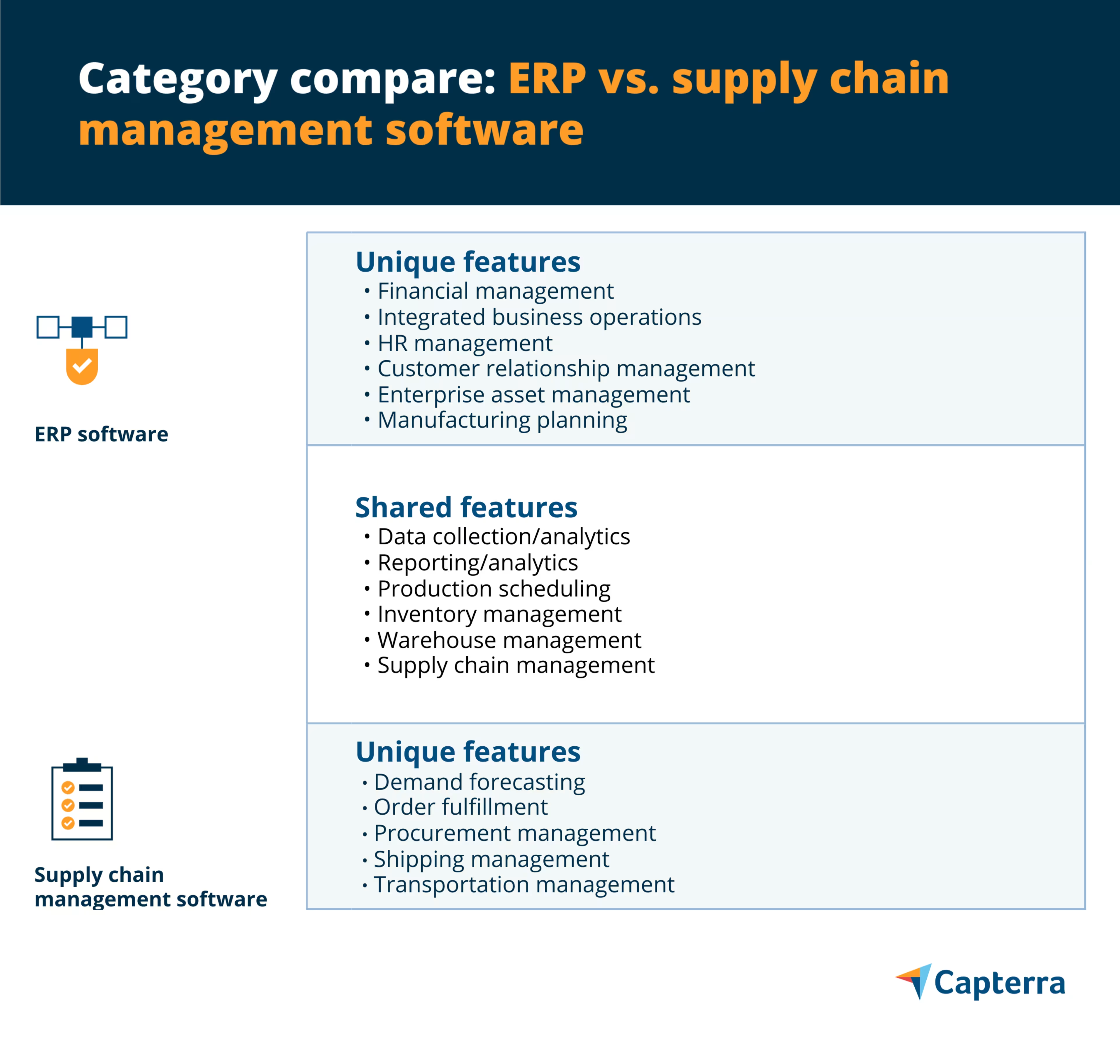
What is ERP software?
Enterprise resource planning (ERP) is an integrated suite of applications that enables businesses to manage and automate various operations, such as financial management, supply chain management, human resources, and customer relationship management (CRM). The software allows different departments to access and share information using a centralized platform.
ERP tools can generate various reports, including financial, inventory, sales, revenue, and procurement reports, that help businesses improve operational efficiency and make informed decisions to identify improvement areas within their operations.
Core features of ERP software
The core features of ERP software include:
Financial management: | Enables users to manage financial resources by providing a comprehensive overview of the business’s finances. ERP systems typically include modules for general ledger accounting, accounts payable, and accounts receivable that automate financial transactions. Hence, the tool helps ensure accuracy and compliance with various accounting and industry standards. It also provides reports, such as balance sheets and cash flow statements, that provide a snapshot of the business’s financial health. |
Integrated business operations: | Consolidates various business functions and processes, including human resources, project management, and accounting. The system stores all essential business data in a centralized database, enhancing accuracy and eliminating data silos. Moreover, it facilitates cross-functional workflows by automating business processes across multiple departments. |
What is supply chain management software?
Supply chain management (SCM) software helps retail and manufacturing businesses plan, optimize, and manage various processes involved in the supply chain, such as inventory management, demand forecasting, and order processing. The tool also assists businesses in selecting, evaluating, and managing suppliers. With this tool, you can monitor vendor performance, negotiate contracts, and ensure timely deliveries, among other operations, to improve operational efficiency.
Some supply chain management tools also use artificial intelligence (AI) to alert users about potential supply chain bottlenecks. It also assesses and mitigates supply chain risks, such as supply disruptions and quality issues.
Core features of supply chain management software
The core features of supply chain management software are:
Inventory management: | Monitors the real-time quantity and location of inventory items, including raw materials, finished products, and goods in transit. The feature also helps inventory managers determine the optimal time to reorder inventory and prevent shortages or stockouts. |
Supplier management: | Simplifies the new suppliers’ onboarding process with features that help verify supplier information, contracts, and compliance documents. The software also assists businesses in managing supplier interactions, performances, and issues. |
Warehouse management: | Optimizes the operations and processes within warehouses and distribution centers. These may include inventory tracking, order processing, and inventory optimization. The software may also have barcoding capabilities to track inventory movements accurately. |
What are the differences between ERP and supply chain management software?
Both ERP and supply chain management systems are used to automate business processes, strategies, and operations ranging from administrative to asset management needs. However, both these tools serve distinct purposes. Here are some differences between the two categories:
Organizational scope: ERP is a comprehensive suite of integrated applications that helps businesses manage key operations, including sales, finance, procurement, manufacturing, and more. On the other hand, supply chain management software specifically focuses on managing and optimizing supply chain processes, including inventory management, supplier relationships, and warehouse management.
User base: Various departments and teams, including finance and manufacturing, can use ERP software within an organization to manage operational business processes. Supply chain management software is primarily used by supply chain and inventory managers responsible for managing logistics, inventory, and supplier relationships.
Pricing: ERP software typically costs more than supply chain management software because the former is used in a more exhaustive sense to simplify various business processes compared to supply chain management software, which is used in a specialized business area. The pricing range for ERP software is typically between $24 to $650 per month. However, the pricing for supply chain management software generally falls between $10 to $135 per month, depending on factors including deployment model, user licenses, features, and customization capabilities.
What are the similarities between ERP and supply chain management software?
Despite the distinctions, both software categories have some common functionality, including:
Financial planning: Both ERP and supply chain management platforms provide real-time data on inventory levels and production schedules that help financial planners make informed decisions regarding cash flow, budgeting, and resource allocation. While ERP software tracks costs across different business processes, SCM software focuses on expenses related to the supply chain. The cost-related insights generated by these systems help businesses improve financial planning strategies and make informed decisions.
Inventory management: Both systems offer inventory management capabilities to help businesses optimize stock levels and monitor inventory movements. Additionally, both these assist inventory managers in order processing, fulfillment, tracking, and ensuring timely customer deliveries.
Reporting and analytics: ERP and SCM software solutions offer robust reporting and analytics tools that can be used to generate accurate financial reports, analyze data, and make data-driven decisions. Some important reports generated by ERP and SCM tools include financial, inventory, sales, supplier, and supply chain reports.
ERP vs. supply chain management software: Which one is right for your business?
ERP and supply chain management tools serve different purposes, and the right choice depends on your business's specific needs and priorities.
ERP could be better if you need a comprehensive tool that integrates various business processes, such as finance, human resources, and manufacturing. However, if your major goal is optimizing the flow of goods and services and supply chain execution, SCM software could suit your business more.
While you’re checking which software is right for you, make sure to consider the scale and complexity of your business operations. While ERP systems are broader in scope and are suitable for businesses with various complex operations, SCM software could be an ideal fit for businesses looking for logistics and supply chain optimization.
Businesses looking to manage more internal/in-house work processes can look for ERP software. On the other hand, retail and manufacturing businesses looking for a tool to handle communications and relationships with external suppliers and stakeholders can go for SCM software.
Additionally, consider factors such as the level of customization you require, your budget, and integration needs. Evaluate how well each software aligns with your unique business goals and organizational processes to shortlist the best solution.
Once you’ve decided which software to use, head to our ERP and supply chain management software category pages to find a list of products and software reviews from verified users.
If you want to narrow your search to only the most popular and highest-rated solutions, check out Capterra Shortlist reports for the top ERP software and supply chain management software. Our reports are based on an analysis of thousands of user reviews.
How to choose between ERP and supply chain management software
Below are a few things to consider when selecting between ERP and supply chain management solutions.
Assess your business requirements. Identify the business processes you need to manage before investing in ERP or supply chain management software solutions. While SCM tools are helpful for supply chain planning, execution, and procurement, ERP software automates various processes, including supply chain, manufacturing, and sales.
Understand your supply chain complexity. If you have a highly intricate supply chain involving multiple locations, suppliers, and distribution channels, SCM software specializing in supply chain optimization could be a better fit for your business than ERP software.
Consider scalability and growth. ERP systems are scalable due to their comprehensive nature and suitability for large organizations with diverse needs. On the other hand, SCM software is designed to scale within the domain of supply chain operations. If your primary concern is scaling up your supply chain operations, SCM software can handle increased complexity in supplier relationships, inventory management, and demand planning.
5 top-rated ERP software
These products are listed in alphabetical order. (Check how we selected them.)
To present the most up-to-date information, the product information below shows the latest real-time ratings, which may differ from the ratings values at the time this report's analysis was conducted, since new reviews may have been left in the meantime.
Trial/Free Version
- Free Trial
- Free Version
Device compatibility
Trial/Free Version
- Free Trial
- Free Version
Device compatibility
Trial/Free Version
- Free Trial
- Free Version
Device compatibility
Trial/Free Version
- Free Trial
- Free Version
Device compatibility
Trial/Free Version
- Free Trial
- Free Version
Device compatibility
5 top-rated supply chain management software
These products are listed in alphabetical order. (Check how we selected them.)
To present the most up-to-date information, the product information below shows the latest real-time ratings, which may differ from the ratings values at the time this report's analysis was conducted, since new reviews may have been left in the meantime.
Trial/Free Version
- Free Trial
- Free Version
Device compatibility
Trial/Free Version
- Free Trial
- Free Version
Device compatibility
Trial/Free Version
- Free Trial
- Free Version
Device compatibility
Trial/Free Version
- Free Trial
- Free Version
Device compatibility
Trial/Free Version
- Free Trial
- Free Version
